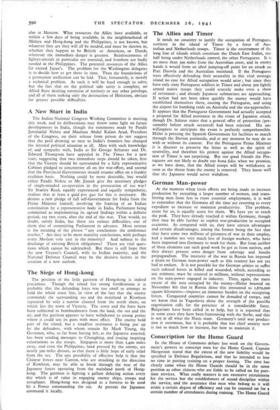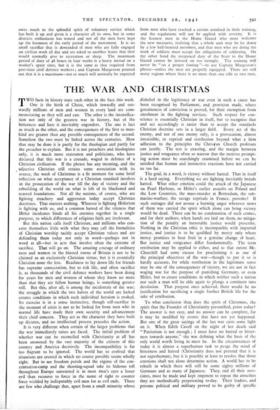Conscription for the Home Guard
In the House of Commons debate last week on the Govern. ment's powers to conscript men for the Home Guard, Captain Margesson stated that the extent of the new liability would be specified in Defence Regulations, and that he intended to lose no time in putting training on a proper footing. The time has clearly come when the Home Guards should be in the same position as other citizens who are liable to be called on for part- time services. What really matters is not extensive recruitment for the service but the establishment of sound discipline within the service, and the assurance that men who belong to it will attain a certain degree of efficiency and can be counted on for a certain number of attendances during training. The Home Guard owes much to the splendid spirit of voluntary service which has built it up and given it a character all its own, but in some districts enthusiasm has waned and not all the men have kept up the keenness of the early period of the movement. It is no small sacrifice that is demanded of men who are fully engaged on civilian work all day and are asked to sacrifice hours that they would normally give to recreation or sleep. The maximum period of duty of 48 hours in four weeks is a heavy inroad on a worker's spare time, but it is the same as that required from part-time civil defence workers ; and Captain Margesson pointed out that it is a maximum—not so much will normally be expected
from men who have reached a certain standard in their training, and the regulations will not be applied with severity. It is the keenest men in the Home Guard who most welcome the new measures, realising that a whole unit may be let down by a few half-hearted members, and that men who are doing the work of soldiers must accept the obligations of soldiering. On the other hand the reciprocal duty of the State to the Home Guard cannot be insisted on too strongly. The training will - never be " on a proper footing "—to use Captain Margesson's phrase—unless the men are properly equipped. There are still many regions where there is no more than one rifle to two men.























 Previous page
Previous page